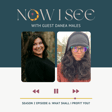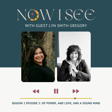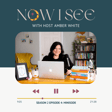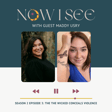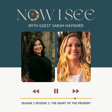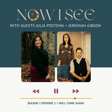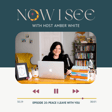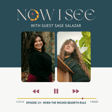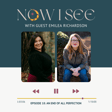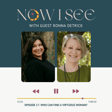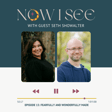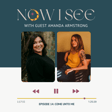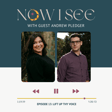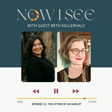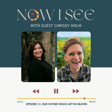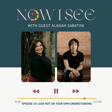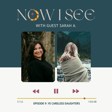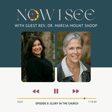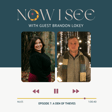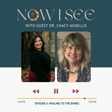Become a Creator today!Start creating today - Share your story with the world!
Start for free
00:00:00
00:00:01

Consider the Lilies: Freethinking Humanism and the Wonder of Nature with Chris Highland
Deciding to leave a life dedicated to Christian ministry isn’t a light decision. But, as many of my guests can attest, when you start to see the cracks in the foundation, it’s often harder to stay.
For Chris Highland, those cracks were in the shape of the people to whom he was ministering and the vastness of the natural world. This episode is filled with our experiences of wonder, awe, and the call to something big enough for everyone.
Resources from Chris
Links
Transcript
Introduction to Podcast Mission
00:00:01
Speaker
I was lost in utter darkness I was trapped in toxic shame I was bound by my religion Till I chose to break away
00:00:24
Speaker
Now I'm finding my true colors For the first time I feel free Now I'm learning self compassion And as I heal I'm finding peace
00:00:51
Speaker
Welcome to Now I See, eye-opening stories from the formerly faithful. I'm your host, Amber White, and here, me and my guests share our experiences in loving and leaving rigid faith systems. Together, we shine a light on the dark corners of these institutions and share the joys of rebuilding life on our own terms. I promise you'll leave inspired, even if you are a little teary-eyed.
Personal Beliefs and Spiritual Ideas
00:01:25
Speaker
Hi, and welcome back to Now I See. I'm your host, Amber White, and today I have a little bit of a unique episode for you. I'm talking with Chris Hyland, AKA The Friendly Freethinker, and while we do follow the typical framework for these episodes, I share a lot more about my current beliefs and spiritual ideas than usual. I've been relatively tight-lipped about my own beliefs so far.
00:01:54
Speaker
in part because I don't know that they matter that much. My goal is not for anyone to try to follow my beliefs, and I'm no longer in the business of conversion. It's also in part because I don't want to open myself up to that criticism. My beliefs are ever-evolving, and I enjoy having the freedom to shift and change them as I learn and grow, without having to account for that publicly.
00:02:22
Speaker
Can you tell I have anxiety and overthink a lot yet? With all that said, I am still very excited to share this conversation with you all. I hope you enjoy hearing us light up in conversation as much as we enjoyed experiencing it. Chris has a beautiful story and I'm inspired by the work he's doing in the world. He has many thoughtful writings, which you can find on his website. I've linked it in the show notes for you.
Journey from Religion to Humanism
00:02:52
Speaker
One in particular stood out to me from our conversation. It's from a piece he wrote for the Asheville Citizen Times called, saying goodbye to the Jesus I once knew. He writes, as he, Jesus, became more human, I became more human. No longer an object of faith, an exalted human being demanding worship and belief, he came down from the clouds.
00:03:19
Speaker
I grew to understand the value of a wise teacher and what it means to be a wise student pursuing wisdom and taking responsibility rather than heeding a divine authority. I can relate to another human who shares my humanity. I can't relate to a transcendent God. Then he left and so did I. No longer found in a church or a religion
00:03:46
Speaker
This Jesus walked on the edges, crossed borders, ignored barriers of belief. He walked away from the church. He was never a member anyway, and so did I. At that stage, even after years of ministry, I sensed I was following him out the door, beyond the artificial walls constructed with creeds, theologies, and scriptures. Tradition handed down authority
00:04:16
Speaker
held no more power over him or me, we left together. What a statement. I remember so vividly what it felt like to realize that I wasn't seeing, hearing, or experiencing radical love for humanity and the world around me in my own faith. The formerly protective walls of the church started to feel more like prison walls
00:04:44
Speaker
keeping me from experiencing the depth of humanity and the beauty of seeing and experiencing things as they are, instead of trying to fit them, and my reaction to them, into an acceptable, church-pleasing mold. I have a hard time believing in a Jesus who wants to limit creation. A creation that, if you believe in the three as one trinity, is his own.
00:05:11
Speaker
The world is just too big, beautiful, and complex to fit into a singular way of thinking, believing, behaving, and understanding. But why do I know? If you'd like to read more of Chris's work, you're in luck. You can find his books
00:05:31
Speaker
essays, blog posts, and articles on his website. He also teaches a variety of classes at UNC Asheville and beyond, but UNC Asheville is my alma mater. His first book, which marked a major bend in the trail for him to a more naturalistic worldview, is called Meditations of John Muir. His last book, Humanist Meditations, reveals how far down the trail away from faith he has traveled. His next book,
00:06:01
Speaker
which will be published in the next few months, is Rambling Reflections for Irreverent Rebels and is a collection of short essays on secularism and faith. I'm personally really looking forward to this one. Irreverent Rebel may be my new favorite title for myself.
Religious Upbringing and Transformative Experiences
00:06:20
Speaker
And finally, I just want to take a moment to share how grateful I am for all the love and support I've received from you all.
00:06:28
Speaker
This podcast has changed my life in so many ways, and I feel very lucky to have the opportunity to host it. So many of you have left reviews, followed along with my spotty Instagram posting, and sent me messages of encouragement. And you all have especially been kind to me as I've been sick over the past six weeks and three episodes. I am so ready for my voice to be back to normal.
00:06:55
Speaker
but I appreciate your encouragement and your well wishes. I just love every bit of it. All right, I'll stop keeping you from Chris now. Let's get into the episode. Hi Chris, thank you so much for being here today. I have really been looking forward to our conversation since we met.
00:07:24
Speaker
And I think it's going to be a great time. I know it will be. I know it will be. Thank you for inviting me. Yeah, it's been really neat thinking about our conversation since we first met, and I think our listeners are going to enjoy your story a lot. So would you please share with our listeners a little bit of your backstory, kind of set the scene for us, you know, how you got into the religion you were part of and what it was like for you.
00:07:52
Speaker
Sure. Well, it's always, I guess the story always changes slightly when I tell it because sometimes people want the nutshell version. And I think it's all kind of nutty anyway, so it just sort of, it takes different forms. So I'll give you the medium length story. Yeah.
00:08:18
Speaker
You know, everybody starts out this way. I grew up in the whatever tradition, but I did, I did. I was raised in the Presbyterian church in the Seattle, the greater Seattle area. And my parents always took me to church. And I still remember when I was about 10 years old, I guess I,
00:08:41
Speaker
achieved something in Sunday school so I was able to stand up in front of the entire congregation recite the the hundredth psalm which I still remember by heart make a joyful noise to the Lord all that you know and they rewarded me with a nice shiny black leather Bible so that was the Bible I carried for many years
00:09:07
Speaker
And that was my reward for memorizing one of the Psalms. Then as time went by there in the Seattle area, I really got involved with the church a little deeper. I finished the communicants class and all that stuff, so I was approved for moving forward in the church.
00:09:36
Speaker
started going to youth group meetings. Those were a lot of fun. And then a girlfriend of mine invited me to her Baptist church youth group. And that kind of opened my vision a little bit more to another understanding of
00:09:55
Speaker
of how to experience Christianity. And it was much more, interestingly enough, it was much more Bible-oriented, much more personalistic in terms of personal interaction, as well as more of a connection, I guess, with God and took that more seriously. But somewhere along the line before he even got there, as a young teen,
00:10:23
Speaker
I watched one of Billy Graham's crusades on my little black and white screen. And when he did the altar call at the end and the just as I am without one plea thing, I gave my heart to Jesus. And Jesus came into my room and filled me with great love and forgiveness. So that was when I was an early teen. Those altar calls are very effective. Oh, yeah. Yeah.
00:10:53
Speaker
And I suppose, I don't know if it's ironic, but years later, I think I was entering college, but years later, I was in a choir at a Billy Graham crusade, and it was in Seattle, and Billy Graham was there, and I was able to sing in an 8,000-voice choir.
00:11:16
Speaker
Wow. That was magical. That was something else. That was inspiring. So, and ironically also that now that we live here in North Carolina, Billy Graham and his empire is right down the road from us here. So that's kind of comes full circle. Yeah.
00:11:36
Speaker
So, you can tell already that this story just starts branching out in different directions, but let me just say that when I got into that Baptist group, I felt very much a part of that and realized that Christianity was more than just Presbyterian. And then I had a girlfriend who was Jewish, so I started realizing that, you know, faith is more than just Christianity.
00:12:06
Speaker
and became a youth group leader, learned how to play the guitar, did a lot of singing. That was a lot of fun. And then one of my friends said, well, you ought to come to this other little house church group meeting. And so I did, and they were speaking in tongues. And he said, well, you really need to experience this. Be full of the Holy Spirit. So I did that, spoke in tongues, did that whole thing.
00:12:33
Speaker
And about the same time, some of us were getting involved with Campus Crusade for Christ, so we were witnessing, we were sharing the gospel everywhere, and then we started speaking in tongues. So we were covering the whole landscape of Christianity, I think Christian experience at that point.
Role as Interfaith Chaplain
00:12:53
Speaker
And then we were kind of deciding, well, where are we going to go to college? So I went to Seattle Pacific, which is a free Methodist conservative evangelical college in Seattle. So I went there, started studying more of the Bible and church history and all these things. It was an exciting time. I really thought, well, I want to learn more about God, about my faith, about the Bible. It took a year of Greek. So I'm studying Greek.
00:13:22
Speaker
in college. It's exciting. Yeah, it was cool. I thought, wow, I can really read the original stuff now and get to know God better in God's original language, which I found out later was Hebrew. Yeah, an Arabic. Yeah, I'll call that stuff. So
00:13:45
Speaker
So what really saved me, and I kind of frame it this way sometimes, what really saved me at the evangelical college was deciding to study philosophy. And philosophy was this whole expansive
00:14:04
Speaker
field, world views, many world views, and it was all about asking questions and not necessarily having answers. So I began to emerge from the more narrow views and still studying religion, got my degree in philosophy and religion, it was a dual degree, and decided to go on to seminary from there.
00:14:32
Speaker
in California, so I did, and that was a Presbyterian seminary, but it was connected with the Graduate Theological Union in Berkeley, which was just a great spectrum of theological institutions.
00:14:46
Speaker
So I was able to take classes from Jews and Catholics and Buddhists and just people across the spectrum there. So it really was a rich experience for me. And of course, when you go to seminary, you think, well, I guess I'm going to go into ministry. I guess I'm going to become a pastor of a church, which most people were doing. And that was the track that they were on.
00:15:12
Speaker
And that was interesting to me, but during seminary, I started attending a synagogue that was on campus. And part of my work as a teacher in a local private school with adults having developmental disabilities, I started taking them to a local Catholic church. So I was going to Catholic churches and synagogues more than Presbyterian churches.
00:15:42
Speaker
And that was just a wonderful, rich time for me. I really loved that. And it really kind of set me on a course of the interfaith work that drew me into that more inclusive recognition, not just recognition, but a celebration of the diversity of worldviews and beliefs and understandings of the stuff that I'd heard about since I was a kid.
00:16:10
Speaker
You know, this God stuff, this Jesus stuff, this Bible stuff, and realizing that, well, there are other scriptures, there are other views of God.
00:16:19
Speaker
other ways of understanding what it means to follow the way of Jesus. And that really inspired me to finish seminary, to go on to chaplaincy work. I don't know how much you want me to talk about that right now, but that really was... Me too. I found your chaplaincy work in the street work that you did really fascinating. So at least I'm here to share about that too. Sure, yeah. Well, I finally got to that point in the story. It feels good.
00:16:49
Speaker
Get the early part done. Yeah, but all of that was literally setting the groundwork for me in terms of what to build on, the foundation of what my faith was emerging, evolving to become.
00:17:07
Speaker
And it was evolving into something I didn't even know what it would become. What shape this was going to take, because it was so different. There was a brand new chaplaincy opening up at the county jail just north of San Francisco, Marin County. And that big, beautiful Frank Lloyd Wright designed
00:17:33
Speaker
building had a jail in it. And that's where I worked for 10 years as a county jail chaplain, the very first one.
00:17:44
Speaker
And what was so wonderful about that is it was an interfaith chaplaincy from the very beginning. And I was the first interfaith chaplain that that county had ever had and that the jail had ever seen. So I was able to do this thing called chaplaincy, whatever that was going to be. And what I found early on was I
00:18:07
Speaker
needed to kind of put all that education, all that experience of faith and religion kind of in the back, put it back a little bit and not be a preacher, not really be there to teach, but to be a listener and to practice something that became foundational for all of my chaplaincy years
00:18:36
Speaker
and that's presence, just simply being present with people in their situation, listening, trying to be empathetic, and if I was asked to try to help people along the way, to encourage them mostly, and connect people with resources if I could. So the time of the jail was just...
00:19:02
Speaker
almost overwhelming to me because it was a world within the world that I had never experienced before. And so most of the people in that county jail, the high percentage of people were non-white and that was very different for me. The county was mostly white. I had grown up in a mostly white area of Seattle.
00:19:32
Speaker
And that was just a cultural, religious enlightenment, I suppose you could say. Just an awakening for me to see that people are so different and that I can walk into difference and appreciate that.
00:19:52
Speaker
And the more I could listen, the more I could learn. And I sometimes called it the seminary of the jail, or it was a new experience of religious education that came from the board of directors who were from different religious traditions. And they hired me to be the chaplain in the jail for everyone.
00:20:19
Speaker
So I often told people that I was a chaplain, that as a chaplain, I was representing the compassion of the faith communities or even just of the community itself by being present in there. So I held seven different gatherings each week in the county jail system. So with men and women, even in protective custody, even in maximum security,
00:20:47
Speaker
minimum security. We had some wonderful times. It was great. I brought a guitar in there. We were singing songs all the time. Yeah, a lot of singing and great voices in there. I mean, we could have gone on the road if we could have let everybody out. We could have gone on the road. So yeah, it was the music. It was discussion, a lot of discussion.
00:21:14
Speaker
a lot of just welcoming people into a space where oftentimes people, the jail inmates, had never experienced other religious perspectives.
00:21:28
Speaker
other ways of seeing themselves in the world. You know, maybe they had been raised in traditions that were saying, you know, you're a sinner and you're in jail because you're a sinner and all these kinds of things. And I was presenting something different. I was saying, well, you're a human being and it doesn't really matter what you've done
00:21:50
Speaker
right now, right here and now. It's about you as a human being who has value and something to offer. And I'm learning from you too. And don't look to me and say,
00:22:04
Speaker
People like to look at chaplains and ministers and priests and others and say, well, would you talk to God for me? Would you pray for me? Would you lay your hands on me, bless me or something? And yeah, I did all that stuff, but it really was a matter of saying, well, I don't have any special connection. You have a connection too.
00:22:28
Speaker
And so oftentimes it was just telling people, well, you know, God's present with you in here as well as with me. And so we're, you know, you're never alone. And that kind of presence work was really what formed my entire chaplaincy ministry work. And it wasn't Presbyterian. I was a Presbyterian minister at the time because I did get ordained, but it was more about being
00:22:59
Speaker
being a human being myself and being aware of my own faults, my own mistakes in life.
00:23:09
Speaker
And then being around people who sometimes had done horrendous things, or at least were accused of horrendous things. And I was able to be,
Transition to Secular Humanism
00:23:19
Speaker
at that point, I was able to get locked into the cells with people. They don't do that anymore. But back in those days, it was so new to have a chaplain coming into that county jail system that
00:23:37
Speaker
depending on the staff at the time, they would just lock me in a cell. And even in the women's unit, lock me in there for an hour or more. And then I would have to somehow reach the deputy to say, come and let me out, come and let me out. I can imagine it's much different today. Oh yeah, it's very different now.
00:24:06
Speaker
So those times were very powerful. And when you're locked in with people, you're also locked into their lives a little bit. And you see people face to face. You're touching people that people in the wider community don't want to even see, let alone touch. Right.
00:24:26
Speaker
And I get to hear their stories and then also get to sing with them, pray with them, be present with them. And after about 10 years of doing that, a friend of mine who was a street chaplain
00:24:40
Speaker
was leaving and he said, Chris, you'd be great out here on the streets. And a lot of the same people that we were working with, you know, he was working on the streets. He was an Episcopal priest and he was working with them on the street as an interfaith chaplain. I was in the jail as an interfaith chaplain. So we kind of switched. He went off to work in a prison and I went to the streets and I did that for another 10 years or so.
00:25:06
Speaker
It was more of the same, but it was out in the fresh air. So I was released, I got released out there. And I still saw some of the same people because jails tend to be revolving doors. And so people were in and out and people had their addiction issues, mental health issues, just struggles with poverty.
00:25:33
Speaker
racial tensions, all kinds of stuff that went on, abuse situations. So I finally was able to really be out working with families and
00:25:45
Speaker
People of various ages spent a lot of time at St. Vincent de Paul. It was a free dining room in town that tended to be where people came because it was a place to eat and a place for community. And that's where we started a lot of our programs to gather people together. So it was the same sort of thing. It's like we're having these interfaith gatherings.
00:26:08
Speaker
And it's not Christian, it's not based on Christianity, it's based on humanity.
00:26:17
Speaker
So that was what we started doing. And then we had volunteers from the community. We had some pretty wealthy people would come in and sit with us and some business people and priests and rabbis and Buddhist priests and all kinds of people. And it just even became richer for me and our whole experience to find our way that might be about faith
00:26:47
Speaker
or might not be about faith. It was about having faith in each other and learning to cope, to handle the terrible things sometimes, the risks, the dangers of being out in the street.
00:27:04
Speaker
And handle that in a way that was, I don't know, was a sense of being cared about, learning that people are already being compassionate with each other out there. And so, as I said before, in seminary, you kind of learn how to be a preacher.
00:27:23
Speaker
You know, you learn how to use your mouth a lot, you know, and speak a lot. And, you know, when I was ordained, you know, ordained to the Presbyterian tradition, you're called a minister of word and sacrament. You know, you're first, the first thing you're ordained to is words.
00:27:41
Speaker
And yeah, and so where do a lot of those words come from? Well, let's get it from the Bible. So we're a lot of Bible stuff, a lot of quoting from ancient scriptures. And that, you know what, that's when another emergence was happening for me, another kind of growth point, evolution, I suppose, that was happening for me, which was realizing, you know, the Bible still has some interesting things in it and some good lessons, but so does the Dhammapada.
00:28:09
Speaker
and the Tao and the Quran and other scriptures of the world that most of us don't have any connection with, and we never hear those, let alone meeting people from those various traditions as other backgrounds. And that's what this expansiveness... It's kind of interesting because I always think of it as expanding
00:28:35
Speaker
my view and experience, but it's also being more inviting and inclusive of all those diverse perspectives and experiences, and once again, being present to listen and pay attention. So that's really, those are some of those growth points for me and emerging times that brought me to the point where I realized, you know what, the Bible can stay on the shelf,
00:29:04
Speaker
for the most part, and it's not so much about faith or, you know, having some kind of religious perspectives and opinions, but it's about being with people and being a teacher while learning, constantly, constantly give and take, kind of constant cycle of experiencing the depths of humanity, the heights of humanity,
00:29:34
Speaker
I mean, there was so many beautiful moments in both of those chaplaincies, all kinds of really beautiful moments, performing weddings. You know, strangely enough, we did so many memorial services and had memorial processions through town. We planted a tree from the Buddhist Center. We planted the tree in front of the Catholic Mission Church, the biggest church in town.
00:30:04
Speaker
And we had a procession to do that, and it was all to honor our friends and the community of the street. So those kind of moments were beautiful. They were heart-wrenching. They filled your heart. They did all of that stuff, you know, because it was really touching the pulse of humanity.
00:30:29
Speaker
So I'm getting there. I'm telling you the story. That's a great story. I love that humanity played such a huge role in your own spiritual transformation. And then it was this reflexive experience that you had. I think there are a couple of things that I see in talking with people who transform their faith and move into new ones or who leave their faith altogether to embrace something different. And that's either data,
00:30:59
Speaker
So data and realities about Scripture start moving them out and they start seeing inconsistencies or they start learning about Aramaic translations versus Greek translations. All that stuff starts to move them out or its experiences with other people. So whether that encounters with people in the queer community and then realizing maybe they don't want to demonize them because they're actually really great friends and wonderful people. Or in your case, just getting to see
00:31:27
Speaker
how diverse humanity is. And I think that is something that strikes a chord with me, because it's really difficult with all the people I've seen and met in my life and in my travels. I can't see all of them sitting in a Baptist church and getting something out of that, or even a Presbyterian or Methodist or anything.
00:31:51
Speaker
like that. It's just individual sex of faiths just aren't enough for everyone all the time. And I think
00:32:01
Speaker
That's such an important and neat part of your story is that you got to experience that for so many years and really see how big the world is and how gray it really is. This idea of black and white just doesn't really exist when you're actually out in the world living in it. And I love that part of your story. I think it's such a huge lesson that we all end up learning at some point that maybe things aren't as cut and dry as we think they are in our minds or as we might've learned.
00:32:32
Speaker
Right. Yeah, that's well said. I kind of skipped over it, I suppose, but a pretty major point for me was realizing that the distractions of the church, distractions of religious dogma and
00:32:50
Speaker
As I said, the scriptures can be great distractions. Our belief systems can separate us from other people and become distractions. And I finally decided in 2001, my first book had just come out on John Muir, a collection of John Muir's wisdom, naturalistic wisdom.
00:33:13
Speaker
And at that point I was still working as a chaplain and I thought, you know, I really don't need to be or want to be an ordained minister anymore.
00:33:25
Speaker
And all those years of working through that, going to the Christian college, going to seminary, getting my Master of Divinity degree, getting ordained, working in ministry. I was also a parish associate in a Presbyterian church for 10 years during that time, so I wasn't totally disconnected from the church. And yet,
00:33:48
Speaker
working in these nonprofits and these chaplaincies with people who were representing very different perspectives. And that became the kind of ministry, the kind of servant, service person that I wanted to be.
00:34:06
Speaker
that defined it. So I thought, well, you know, this whole thing of being a Presbyterian minister or ordained minister just didn't cut it for me anymore. And I didn't really see the church, by and large, really getting that involved and supporting the kind of work that we were doing.
00:34:28
Speaker
You know, when I was working on the street, I was hiring people from the street to be my chaplain assistants. And oftentimes they were the ones who they had the personal experience of living outside and they could relate so much better. So I brought them on the team. We had a chaplain team and that felt great because it wasn't just about me.
00:34:54
Speaker
It wasn't just, well, Chris is the chaplain. He said, well, Chris is the chaplain, but these other people are chaplains too. They don't have the degrees. They don't have all those things. They don't have the distractions.
00:35:06
Speaker
of having some kind of institutional thing behind you saying, yes, we bless you. So I, in 2001, I went to the presbytery, which was a gathering of pastors and lay leaders in the same location, this is in California, in the same location where I had been ordained,
00:35:29
Speaker
or at least accepted for ordination. And I stood up in front of all of them, and I read my statement saying why I was leaving the church, why I was giving up my ordination. And one of the lines that I used, which kind of blew some minds, I suppose, is I said, I'm following Jesus out the door of the church. And I said, I don't think that he would be welcomed.
00:35:57
Speaker
in the Presbyterian Church, in your church, in your church, whoever's church. That's not the Jesus that I follow. Well, that's how I said it those years ago. I might say it differently now, but really, it was really clear to me
00:36:16
Speaker
partly because a lot of pastors, church pastors would tell me privately, they'd say, well, Chris, I think you're really doing the work of Jesus on the streets. You know, you're going to jail. This is what Jesus, I could almost hear that they were saying, yeah, I wish I was doing that instead of being in the pulpit every week.
00:36:39
Speaker
So yeah, that's that distraction part. So I was able to just say, okay, I'm no longer beholden at all to the Presbyterian Church or really to any church. I am beholden to the people I serve, the people who have become my community on the streets, at St. Vincent de Paul, in the parks, at campsites, in the shelters.
00:37:07
Speaker
you know, on street corners, on sitting on a bench, you know, or in a tent on a hillside with somebody. You know, that presence kind of stuff, that's all that mattered to me anymore. And it was so delightful to be able to say to people, I am here for you, and I'm not representing any particular religion, you know.
00:37:31
Speaker
I am representing the humanistic care and concern and compassion of the wider community. And we had people on our board who weren't necessarily religious, didn't really represent any particular synagogue or mosque or temple or church. They were there because they just cared about people. They said, we want somebody out there with
00:37:58
Speaker
with these folks that we don't really understand that well. So yeah, I guess it's no surprise then that I finally came to the point where I said, well, what am I going to call myself? Particularly when I moved away from chaplaincy, I directed a shelter, emergency shelter for a few years. Then I went on to manage senior housing
00:38:26
Speaker
Independent seniors who were kind of you know in a lower economic bracket So that was great did that for a number of years? But so in that process, you know There's still this emerging going on where I'm kind of thinking well Do I really believe any of this stuff anymore and how connected am I with any religious? Religious groups and I really found that humanism the the philosophy of humanity
00:38:56
Speaker
really made sense to me. And that is not to deny nature because to me, you know, the understanding our connection with nature is really has become the foundation of everything for me. Our interconnection with the natural world. So that's why my first book on John Muir, really he became kind of a secular saint for me in some ways, you know, along with Thoreau and Emerson and
00:39:24
Speaker
Margaret Fuller and some other people. So I found that the philosophy of humanism made a lot of sense because it was essentially saying, we are responsible for our lives. We are responsible for what happens in the human community. We cannot look outside of ourselves for salvation.
00:39:49
Speaker
we cannot look outside of ourselves into some supernatural realm for somebody to come and help us. I understand the human need to feel cared for and to have an overseer or a great parent in the sky to care about that. And I know I don't make light of that.
00:40:14
Speaker
If people have a prayer life and devotional life and are following a path of faith, that's fine. But my concern is how human is it? Are you willing to take responsibility for your own life and for what's going on in your community and what's going on around you?
00:40:39
Speaker
Or is your faith your religious convictions, is that a distraction from being the best human being that you can be?
00:40:51
Speaker
If it is, then maybe it's not healthy, maybe it's not helpful for others, and that's what matters to me. And so overall, through that, I found the free thought tradition, the secular tradition of free thinking,
00:41:11
Speaker
that makes a lot of sense to me. So that's why these days I call myself a free-thinking humanist. I teach classes quite often and give talks, and what I try to focus on is it's okay to be secular. Secular is not a bad word. It means here. It means here and now.
00:41:33
Speaker
our responsibility for here and now. And there may be another realm somewhere, there may be another world, there may be something out there. But we don't know. We don't know. We have to be agnostic about that kind of thing.
Teaching and Lifelong Learning
00:41:51
Speaker
But regardless of whether we choose a faith tradition,
00:41:55
Speaker
or not, or choose to walk away from a tradition, it's really a matter of, yeah, you have the choice. And there are alternatives. There are alternatives. If you feel like you don't have an alternative and you're only presented one view in life, one thing to commit your life to, one book, one faith, what does it say? One faith, one baptism.
00:42:23
Speaker
You know, that's all I was presented with as a kid. It's like, well, there's one religion that's Christianity. There's one kind of Christianity that's called Presbyterian. And that's all.
00:42:35
Speaker
Yeah, but then experiencing all these different people and communities and, you know, having a Jewish girlfriend and then, you know, becoming involved in evangelical groups and Pentecostal groups, and then in college, having all these different philosophies and world religions, studying world religions. It was wonderful. It was really wonderful. And a Christian college. Yeah, that's pretty remarkable, because that's not the Christian college I attended.
00:43:07
Speaker
I love what you're saying because when I think about fundamentalism and the type of college that I went to and the tradition that I grew up in, the goal of it was to isolate you, to keep you in as small of a bubble as possible and to keep you from experiencing anything outside of that because then you might be tempted to stray from this very specific
00:43:32
Speaker
they love to focus on there's a narrow way to know God. There's the narrow way to heaven. And they tried to help you stay on that narrow path by creating this really intense dogma, really, to try to keep you in line and then scare you into a specific way of being. But when you get to know people outside of that, even just a little bit, I came face to face with someone in college who had an experience at a sermon
00:44:01
Speaker
that broke her. And when I got to see how that dogma was affecting someone who had a real life experience, it was a game changer. It broke the whole system down for me. And all of a sudden, I'm like, well, if she doesn't fit, then I don't fit either. And neither does anyone else. When it's that limited, how can it possibly be for the whole world? It's not
00:44:24
Speaker
For God so loved the world, if you wear pants as a woman and you're not accepted anymore, that is extraordinarily narrow and cannot possibly be loving if that's the case. And so I just really struggled with that. And so I appreciate and resonate so much with the humanist ideal.
00:44:45
Speaker
the idea that it's a big world out there full of lots of kinds of people and community and creating community with each other and trying to see each other more holistically instead of through a lens. It's a game changer and it has certainly changed my life the better. All these transformative moments you've had in your life too are right around that same idea. It's such a beautiful thing. I love it. I love that it's such a big part of your story.
00:45:15
Speaker
And that you're now writing and teaching about it, too. That's really great. Yeah, it has been a great passageway, I guess, for me, into teaching. I've been teaching over the years.
00:45:31
Speaker
But really to be able to do that more here on the UNCA, the University of North Carolina campus. Oh, that's a long water. Yeah, a few other places. Yeah, I'm at the Reuter Center, so it's mostly older adults and people who really want to
00:45:48
Speaker
to continue their lifelong education, which I would hope that all of us would want that. Yeah, lifelong learning. To keep learning. You get a degree or something, and that's not the end of education at all. It should never end. So I love teaching because I learn more, and that's what it's about. There's a great saying I learned even at the evangelical college that I went to,
00:46:17
Speaker
there was a little line that said, the greatest teacher is the one who teaches students to be self-taught, to be self-taught. You teach people to be self-taught. You know, you instill in people the thrill, the desire, the excitement, adventure of continuing to learn. And, you know, hopefully that starts when we're children.
00:46:47
Speaker
and just continues throughout our lives. And, you know, as you were mentioning, you know, the people who want to put kind of the guardrails around us or the box and say,
00:47:00
Speaker
what goodness is, morality is, how to be a good person and all that stuff. They're missing the point. They're missing the point that all of that, our humanity, our connection with nature, you can't put that in a box. And you can't put that, you know, and put limits on that.
00:47:20
Speaker
and say, well, you can only go this far, and please don't think about those things. You shouldn't think about those things. And you shouldn't, you don't go there with those thoughts, because that's doubts. And don't ask those questions, because those questions will be disturbing to your faith and all these kinds of things.
00:47:40
Speaker
I learned way back when in studying philosophy and I just taught a class on on the Roman Stoic Seneca and Seneca was a perfect person for this too and that was you know he lived at the time of Jesus and he was he was a questioner just like all philosophers have been people who are not afraid
00:48:03
Speaker
of asking hard questions, difficult, troubling questions sometimes, and being willing to let those, as I say in my classes, let those questions hang in the air.
00:48:18
Speaker
Just let them float, because no one can really find the full, complete answer. It's more like you learn something, you relate to it for a while, and then you move on, and you come to other ones. One question leads to another question. So this is one thing that I often come back to. We talked about distractions.
00:48:45
Speaker
The greatest distraction I think that we have is theology. And think about it. I mean, I studied thick theology books for years, and we loved that stuff.
00:48:57
Speaker
Oh yeah, Christology, theology, all theologies and stuff, and of course the Bible digging into that too. But regardless of where people come out, I mean, who knows? Who knows the mind of God, you know, if you're going to use that language?
00:49:18
Speaker
Who can claim that they know anything substantial to express? This is who God is, this is what God feels, this is what God thinks. But if you listen to what a lot of evangelicals say and fundamentalists say, they know.
00:49:36
Speaker
This is what God thinks. This is what God feels. This is what God wants for me. And guess what? This is what God wants for you. And I'll tell you what that is. So to me, all that stuff, what does that do? It becomes an obstacle and it distracts us from what we could be doing with a humanistic, naturalistic outlook that's more relational.
00:50:06
Speaker
rather than, oh, my relation is up there, you know, it's up in the sky, or it's in another realm, it's in another world, and it's all about, well, are you going to go to heaven or not?
00:50:21
Speaker
I go back to my secular saint, John Muir, who said, well, you know, we don't know if there's a heaven, but it can be heaven here. It can be hell here, too. But there's so much beauty in the world. So much beauty. And we're a part of that. So there's beauty in people, too.
00:50:44
Speaker
rather than focusing on the morality issues, on the do you believe correct kind of issues, the orthodoxies, the traditional stuff. You focus on those things, you miss the point. You miss the whole point.
00:51:04
Speaker
I'll just say that when I was the parish associate in a Presbyterian church for those years, the pastor who became a close friend of mine, he's passed away now, but he had a great outlook. He would say to the congregation, the worship is over, let the service begin. Right?
00:51:26
Speaker
We're so used to saying, well, I went to the service. There's a church service. I went to the worship service. Well, he split those up and he said, you know, the worship part, the hour of worship is over. The service begins.
00:51:43
Speaker
And, you know, such a simple concept. And yet I think, and yeah, and so much of the church, I think so much of the church has missed that opportunity to say, okay, we enjoy gathering together once a week to do this and praise God and pray and sing and do all these things and that's worship. And then after that hour,
00:52:11
Speaker
It's something else. It's just our daily lives. But maybe what really matters is our daily lives. Maybe that's an important part of it. Or the whole thing.
00:52:25
Speaker
The whole thing, the whole thing. Yeah. Yeah. I love that you talk about theology as a distraction because I remember being in Bible college and women were not allowed to take theology classes at the Bible college I attended. And that was a huge point of contention for me. I did not like that very much. Yeah. But I remember sitting at tables and listening to men, right? Because that was my place. And just listening to them argue and fight and
00:52:55
Speaker
just spend hours and hours breaking apart the tiniest concept and trying to decide who was right and who was wrong. And I remember sitting there at one point and thinking,
00:53:07
Speaker
this is one of the dumbest experiences I've ever had in my life. Just to put it crudely, just like, this is so ridiculous. This is the most pointless thing I have ever sat around. Meanwhile, there are lives happening all around us and like, there's so much going on and we're in this tiny little bubble having these tiny little conversations and there's an mountain over there, you know what I mean? Like, and I just,
00:53:31
Speaker
resonates so much with the idea of not getting lost in the haystack, looking for a little needle, but instead looking at the feel that the hay is coming from and thinking, what a wonderful thing, and connecting with that. If I have any theology, it is this. It's that if it's not big enough for everyone,
00:53:56
Speaker
for all of time in the whole world to connect to, then it's probably not the only way. It can't possibly be. That would be the cruelest joke, and not even a joke, it would just be cruel if that were the case. And that's where I think the nature piece comes in for me. Because if there's something we all have to connect to, it's what we're a part of, and that's nature. And we're part of that cycle.
00:54:23
Speaker
And I think the church does, a lot of churches, I should say, do a really good job of starting by disconnecting you from yourself,
Nature and Spiritual Understanding
00:54:30
Speaker
right? That's the first nature they're really good at separating you from and trying to correct. And then that just kind of becomes a rock rolling downhill collecting moss of everything else that it disconnects you from, whether that's the natural world. I was recently in
00:54:50
Speaker
very fortunate to be in Washington hiking in Mount Rainier. It was beautiful, it was majestic, it was powerful.
00:54:58
Speaker
I was hiking way further than I thought I could go and I'm all of a sudden like so close to Mount Rainier I'm touching the snow. And I just had this moment of clarity because I was just experiencing it and how magical it was to be there with these people and with this person that I love very dearly. And I was so moved, I was crying, like it was a whole experience, right? And it hit me that in 10, 15 years ago,
00:55:28
Speaker
I would have been standing in that spot and trying to course-correct that emotional experience to say, oh, how majestic is this one way of God and how lucky am I that you put me here? And it hit me that I have a much more rich and full emotional life and connection to the world around me now than I ever did then when I was trying to always stay in those bounds. And how beautiful is that?
00:55:54
Speaker
And how much more connected am I to the world and to my community and to other people? Because I'm not always trying to see if they fit and if I can course correct them too. And it's just, it was a waterfall moment for me of understanding and appreciation for what a broader understanding of the world can bring you and how much beauty that lets in.
00:56:20
Speaker
And I just, when we were first talking, I remember resonating with you so much on the nature aspect of spirituality and a connection to something greater. And that's really my connection to something greater is the natural world and community. I love that that's such a big part of your story and that John Muir is a secular saint for you. I think that's really neat. Well, you mentioned beauty and one of my favorite quotes from him in his journals is he says,
00:56:50
Speaker
He says the greatest or the best synonym for God is beauty. I really enjoy that because
00:57:00
Speaker
It pushes out these definitions. Everybody has their definition of what does God mean? What does all that stuff mean? A spiritual spirit and those kinds of things. And, you know, I taught a class not long ago on Carl Sagan, the astronomer Carl Sagan, and he was fascinated with religion.
00:57:22
Speaker
And, you know, it was one of those kind of people like John Muir in another way. I mean, John Muir was much more on the Earth and Carl Sagan was much more out in the cosmos, which is great too. It's all a part of nature. And, you know, he was always kind of trying to help religious people to stretch their image more of
00:57:44
Speaker
of what that means. If we have billions and billions of galaxies, not just stars, but galaxies, it's kind of big. Pretty fast. It's huge. It's huge. It's all huge. So if you have a little image, a shrunken image of God,
00:58:06
Speaker
you know, to where, you know, I mean, I just taught a class on Christian nationalism. And we're talking about people who want to put, we ought to get God back in the schools and get prayer back in the schools and get the Bible back in the schools and all this kind of stuff. And they say, you know, they claim that the Supreme Court, you know, threw God out of, you know, expelled God back in the 60s. It's like, well, that's not, what kind of God is that?
00:58:37
Speaker
You know, that you can expel God from school. How did that happen? Or that you can't pray in school just because a teacher can't get up and say a prayer. So, you know, I see one of the greatest pushbacks to narrow thinking and the stuff that to the extreme leads to something like Christian nationalism. I see that as the best way to educate people is to keep saying, well, how big?
00:59:07
Speaker
How big can you think? And the way we can do that as free thinkers and humanistic free thinker, secular people is to say, look at nature, look at nature, go to the mountains, take a walk in the forest, be it by the ocean, take a walk by the river, whatever it is, sit in your garden or walk in your garden.
00:59:33
Speaker
I mean, pay attention. Pay attention to the wonder and the beauty of the natural world. And it might just give some hints for you to learn how to be a better human being and to feel more interconnected, not just with the natural world, but also these natural beings we call human.
00:59:55
Speaker
And with ourselves, with ourselves too, and the goodness and the beauty within ourselves. I mean, I'm not an idealist, I'm a realist in terms of human frailty and the fact that we
01:00:11
Speaker
we're messing this world up so badly, because we've forgotten. We've forgotten our wider connections to each other and to the creatures we share the planet with. You know, we live here in North Carolina, and we're near the Smoky Mountains, but we're in the Blue Ridge Mountains here.
01:00:35
Speaker
And almost every day, you know, we're seeing the black bears walking by and the bobcats and the coyotes and all these different species of birds. And it's a wonderful experience to be kind of getting a front row seat to what's nature doing.
01:00:54
Speaker
And every day being challenged to pay attention more. And you know what? It connects back with all those years ago and all through my ministry time of presence.
Writing Journey and Interfaith Marriage
01:01:06
Speaker
If you're present, you're paying attention and you're learning what's going on around you. Well, if there are not so many people around, there's more
01:01:15
Speaker
wildlife, then you pay attention. And what can I learn from them? How can I listen to them more and gain knowledge of myself and the wider human community? So that's an important part of it for me. And also, you were talking about being up by Mount Rainier, which is, of course, my home area up there in the Seattle area.
01:01:40
Speaker
But it also made me think of Muir when he went to Alaska. And John Muir went to Alaska quite often. And one time when he was going up there, he went on a steamship, a steamboat, up to the fjords up there in Alaska. And he just happened to be on board with a group of missionaries. And they were going up to bring the good news to all those poor pagan heathen
01:02:07
Speaker
uh dirty native people yeah yeah and so they had their bibles they were singing their hymns all that kind of stuff well mure was steeped in that because he even raised he was raised in that kind of culture but he had already emerged himself he'd already
01:02:24
Speaker
He'd already been there and gone down the trail further. Anyway, so they get up there and he said, as soon as the steamship came into the harbor and they saw the mountains of Alaska, he said suddenly the hymns and the Bible readings and the theology and everything just faded away and they were awestruck by the beauty of those mountains. And in John Muir's description, he said,
01:02:53
Speaker
Nature's Bible was open for them. I love that. Yeah, isn't that great? That is great. That is great. And it's such a stark contrast from how I spent the first 21 years of my life in fundamentalism. I actually remember being in an English class and we were reading Wordsworth. And I am a Wordsworth junkie. It happened. I was a literature major. I remember her teaching us.
01:03:21
Speaker
that Wordsworth had a great appreciation for nature. And while that's okay, he worshiped nature and nature is not God. And so this is actually a very sinful way. And so we don't need to idolize Wordsworth. And I remember sitting there and thinking, that is the most ridiculous thing I've ever heard in my life. Like, how is that not a form of worship to creator if you're appreciating the creation and
01:03:47
Speaker
I just, I love that my life has come so far that you and I are sitting here and having this completely opposite conversation. I think probably a similarly for you too, right? It's really, really special. I'd love for you to tell our listeners more about some of your books and projects and things and ways they might be able to connect with you outside of this episode.
01:04:10
Speaker
Yeah, sure. Well, after that Muir book, I continued and ended up with a six-book series of essentially nature meditations, various thoughts from people like Thoreau, Emerson, Margaret Fuller, John Burroughs, who's another one of my
01:04:32
Speaker
my secular saints. Walt Whitman, I taught a class on Walt Whitman too. He's great. His poetry as well as his universalistic kind of view of things, connection with nature, powerful stuff. And after that I did write, I started writing some things about my chaplaincy years. There's a book
01:04:56
Speaker
that I actually am quite proud of in a way. I go back and read it every now and then. My address is a river.
01:05:05
Speaker
my address is a river, and it's a collection of about 70 or so short stories of my chaplaincy experiences over the years are all true stories. And I think that if a person read my address is a river, probably get a pretty good encapsulation of everything I've been talking about today, what we've been discussing. Because really that was the heart of my emergence from
01:05:33
Speaker
from faith and from more of that narrow understanding. And since that time, I've really enjoyed the fact that we came back, we moved from the Bay Area back here in North Carolina about seven years ago now. And about that time, I was noticing in the newspaper, there was a religion section in our local newspaper,
01:05:59
Speaker
And I wrote to the publisher and I said, well, or the editor, and I said, well, I have this background in ministry and chaplaincy and interfaith work. And I see that most of your articles in the religion page are all conservative Christians. And I have a different perspective and I'd like to share that, you know, and write some things. So they actually took the risk and said, yeah, go give it a try. Seven years ago, and I have written a column
01:06:29
Speaker
for the newspaper for the last seven years every week.
01:06:34
Speaker
There's a column in the paper every week. And now it's in the USA Today network. So I'm hearing from Texas. I'm hearing from New England. I hear from Colorado. I hear from Mississippi and Pennsylvania. I've been hearing from people who are reading these articles who are saying, they're either saying, you know, thank you. It's great to see this. It's great to see it in the religion pages.
01:07:00
Speaker
this kind of a thing, and other people of course are a little troubled by some of it. But I'm approaching topics, subjects, issues of faith from a secular perspective, but without
01:07:21
Speaker
being anti-religious without putting people down. And I think that really resonates with a lot of people. So what I do is after I've written 40 or 50 of these columns, I say, OK, I'm going to publish them. So I slap them together and collect them and publish a book. So I think I'm up to 28 books now because I just keep doing this over and over again. And I love it. I love the process.
01:07:49
Speaker
You know, it's easy for people to publish books now. And so, I mean, without going through the big publishers, they're self-published. But it's really fun for me to do that. And I've got a couple other ones coming up. The last one I published was Humanist Meditations.
01:08:10
Speaker
Humanist meditation so it's kind of in a sense. It's kind of like literal bookends from John Muir book at the beginning with meditations of John Muir and now humanist meditations But I keep going I'm not gonna stop I keep writing these things every week and I'm I'm gonna keep publishing books and I should say here that Carol Carol my wife Carol is a Presbyterian minister. She decided to stay in the church and I left and
01:08:40
Speaker
And she's fine with that. And we've been together now for a number of years. And do we have some differences of belief? Of course we do. But it hasn't been a barrier for us. And let me just say, because I love to tell this story and I've written about it too, when we got married,
01:09:04
Speaker
We got married because we had so many friends in the interfaith community. She was the director of a large interfaith council in California. I was a member of that council. We met each other as she was doing some chaplaincy work, and I was too. So we eventually got together and decided, well, we love each other. Let's get married. So we did. And we got married at a Zen Buddhist center there in California, Bay Area.
01:09:32
Speaker
You could say, oh, that's a very California thing to do. Yeah, I guess it was. But here she was at that point. She was still a minister, still a Christian. And here I am, the secular guy who is doing his work, more social work kind of stuff. And so we got married at the Zen Buddhist Center and there were four officiants and they were all our friends. And we wanted, we had so many friends in the community that we wanted to
01:10:01
Speaker
bring them into it. So we had four officiants. One was a Christian minister friend of ours. One was a Zen Buddhist priest. One was a Jewish rabbi. And one was a Wiccan witch. How fun. A Wiccan witch. All four of them. And you know what the clincher is? All women. Oh, I love it.
01:10:25
Speaker
That's a dream marriage ceremony for me. It was fantastic. It was fantastic. I love that. And because of that kind of work that we did over the years, the crowd that was there in the Zendo at the Zen Center,
01:10:41
Speaker
There were evangelicals there. We had family members who were wondering, why are there big statues of Buddha here? You know, that kind of thing. And Catholics and Jews and Sufis and Wiccans. And it was just, it was so cool. And it was a celebration of love, but it was also a celebration of all the work
01:11:05
Speaker
that we'd done over the years as chaplains, as ministers, as human beings who love people.
Conclusion and Reflections
01:11:14
Speaker
And that really was the foundation. I just love that. You brought your whole life into this moment, which is such an important thing in marriage, I think.
01:11:23
Speaker
Oh, that's beautiful. That's one of the coolest wedding stories I've ever heard. I'm so glad you shared that with us. I love that. And of course, I met you because I know Carol through her Enneagram work at Grey's. It's really neat. And I've enjoyed knowing you both.
01:11:40
Speaker
It's been a real pleasure and what a great conversation we've had today. I really appreciated this. It's been, it's a great way to, for those of you who are listening, it's Monday morning. It's a great way to start a week. I'm very fond of it. So we've reached the point in the episode that I have a love-hate relationship with because it's the end, but I love these questions and I'm excited to hear your answers. So if you will, please tell me,
01:12:10
Speaker
What is something you see clearly now that you didn't see before when you were the most immersed in the traditional faith that you grew up in? Well, it's hard not to respond with pretty much summarizing everything I've been talking about. We talked about today because I compiled a book a few years ago and I've always been clear on this for myself and I finally put it into a book form
01:12:40
Speaker
And the title is Nature is Enough. So I think what I see now that I didn't see in the past is that there doesn't need to be a super nature, anything above, beyond, beneath the natural cosmos. And that is an eye-opener because it literally
01:13:05
Speaker
opens your eyes to the beauty that you can call God, you can call it, you know, call it what it is, call it just everything. So that's, I guess that's one way I would say it.
01:13:21
Speaker
I love that because it is such an eye-opener. It's a magical experience to connect with the world around you. I love that. And our last question today is, what have been some of your greatest moments of joy in rebuilding your beliefs and your life after leaving your faith?
01:13:43
Speaker
Yeah, that's great. That's a good question. I find so much joy in my teaching when a student will come to me and say, well, I've never heard these things before. I never knew I was a free thinker until you described what that is. I never knew that I could question my faith.
01:14:11
Speaker
And those amazing moments when I can teach an entire class and be upfront in every way about the fact that I am a humanist, secular person, and someone will come up to me and say, well, I'm not sure if you're a Christian or not or what your religion is, but I appreciate what you teach.
01:14:34
Speaker
And that comes out in my columns, too. So those are the joys. And I can't end this without saying the joy of talking over all these things with my wonderful wife, Carol, and the love and the joy that we feel in our relationship with our differences of belief
01:14:59
Speaker
and sharing the foundation of our love of nature and our running to the windows together to see our bobcat walking by. Things like moments like that, just as precious as can be. So thanks for asking that question. Yeah, those moments really are precious. Yeah. Well, Chris, thank you so much again for being here and for having this phenomenal
01:15:27
Speaker
vulnerable and just beautiful conversation with me this morning. I appreciate it. Very meaningful. Thank you so much for having me. And you're doing great work. Oh, thank you. You as well. Thank you.
01:15:51
Speaker
Thank you for tuning into this episode and being on this journey with me. You can find resources and links in the show notes. If you're enjoying the show, please subscribe, rate, and review, and follow along on social media to help us grow.
01:16:06
Speaker
Now I See is independently funded by me. If you'd like to help support the show, you can donate directly or purchase a merch item on the website. Music for this episode was made by Alana Sabatini, a former faithful and talented musician. And finally, this podcast is made possible by the incredible team at Softer Sounds, a feminist podcast studio for entrepreneurs and creatives providing technical skill with tender support.
